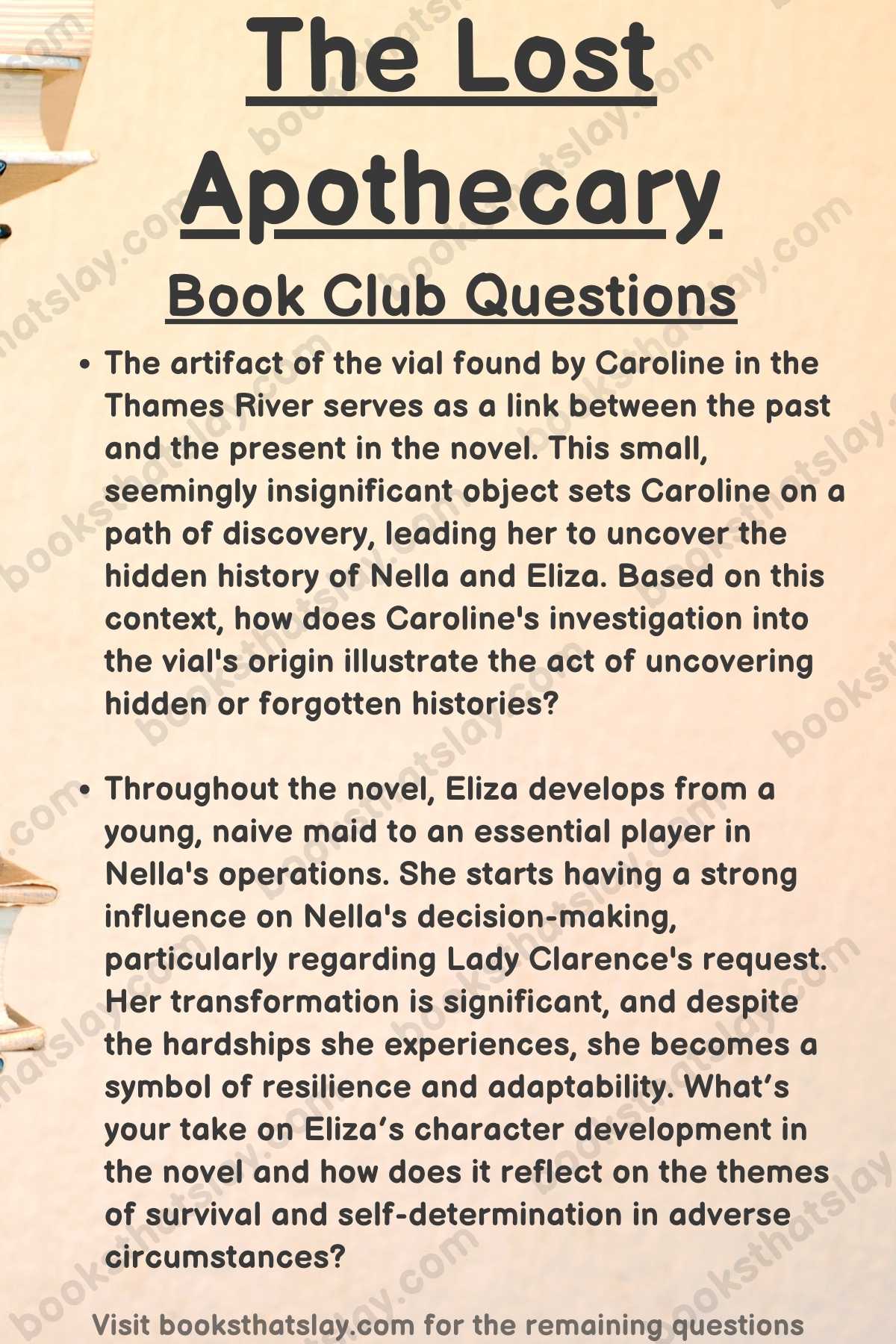10 The Lost Apothecary Book Club Questions For Discussion
In the shadowy depths of 18th-century London, a clandestine apothecary dispenses more than remedies. Nella, a former healer turned secret avenger, creates deadly concoctions for women trapped in abusive relationships.
Her world is disrupted when a young girl seeks her help, igniting a dangerous bond.
Centuries later, historian Caroline stumbles upon a mysterious apothecary vial, unraveling a forgotten past. As the lives of these women from different eras intertwine, a haunting tale of secrets, revenge, and redemption unfolds.
Join us as we delve into Sarah Penner’s The Lost Apothecary with these questions, exploring themes of female empowerment, the complexities of justice, and the enduring power of the human spirit.

The Lost Apothecary Book Club Questions For Discussion
- The characters in The Lost Apothecary exhibit diverse perspectives and experiences with regard to themes of betrayal, feminine power, and secrecy, allowing us to see a broad range of responses to societal pressures. Nella, for instance, is driven to her apothecary trade by betrayal, and operates within a strict code to protect and empower women, while keeping her work a super secret.
What’s your take on the way these three themes interact and intersect in Nella’s character development? Also, what do her actions and choices reveal about the societal expectations and limitations for women during her time period?
- Sarah Penner uses a dual timeline in the novel to compare and contrast the experiences of women across centuries. While there are many similarities, the differences are evident as well: Nella and Eliza, living in 1791, face severe societal restrictions and dangers that lead them into situations of desperation and danger, while Caroline, in the present day, has greater freedom and options than her respective counterparts.
How does the use of dual timelines and alternating points of view help us understand the historical context of women’s struggles, and in what ways does it emphasize the progress made, or lack thereof, in women’s rights and societal status between the 18th century and present day?
- The artifact of the vial found by Caroline in the Thames River serves as a link between the past and the present in the novel. This small, seemingly insignificant object sets Caroline on a path of discovery, leading her to uncover the hidden history of Nella and Eliza.
Based on this context, how does Caroline’s investigation into the vial’s origin illustrate the act of uncovering hidden or forgotten histories?
- In the novel, each of the three main characters grapples with the aftermath of personal betrayals. Nella was betrayed by Frederick, Eliza was betrayed by her employer, and Caroline was betrayed by her husband.
In what ways does the novel explore the personal and societal consequences of these betrayals, and how do these experiences of betrayal inform the actions and decisions of Nella, Eliza, and Caroline?
- Nella Clavinger is depicted as a woman who has endured intense personal suffering and ultimately channels her pain into a form of vigilantism, targeting oppressive men and aiding the women who have suffered under them. Given her tragic history, she becomes a purveyor of poisons in response to her ex-lover, Frederick’s deception and the harm he inflicted upon her.
Do you think there that every woman on Earth has traits that Nella Clavinger has, provided she has suffered as much as Nella has?
- Throughout the novel, Eliza develops from a young, naive maid to an essential player in Nella’s operations. She starts having a strong influence on Nella’s decision-making, particularly regarding Lady Clarence’s request. Her transformation is significant, and despite the hardships she experiences, she becomes a symbol of resilience and adaptability.
What’s your take on Eliza’s character development in the novel and how does it reflect on the themes of survival and self-determination in adverse circumstances?
- Eliza Fanning is characterized by her hope and belief in the power of the mystical, offering a stark contrast to Nella’s more grounded and pragmatic approach to the world. Her faith in the magical Tincture to Reverse Bad Fortune and her subsequent handling of the fallout from Lord Clarence’s death highlights her youthful optimism and resilience.
How does Eliza’s youthful optimism, embodied by her belief in magic, influence her decisions and relationships, particularly with Nella, throughout the novel?
- The character of Mr. Amwell serves as a manifestation of the oppressive and dangerous patriarchal society that Nella, Eliza, and other women in the novel must navigate. He is depicted as a flat character with no redeeming qualities, serving as a source of horror and distress for Eliza.
What’s your take on this portrayal of Mr. Amwell’s character and how did it contribute to the novel’s exploration of patriarchy, gender dynamics, and the concept of justice?
- The novel explores the manifestation of feminine power in the Georgian era, a patriarchal epoch that offered very little autonomy to women. Nella and Eliza serve as prime examples of women in the Georgian era who resist conventional gender roles, utilizing their limited control to exert broader influence over their lives.
How do Nella and Eliza’s individual paths of resistance illuminate the different ways in which women were able to exercise their power, and how does their portrayal challenge or adhere to the societal norms of the Georgian era?
- The theme of feminine power extends beyond the individual to the domestic sphere, with characters like Lady Clarence exerting control over their domestic lives in an attempt to manipulate their destinies. The theme is in contrast to the patriarchal social structure of the Georgian era, providing a nuanced understanding of the female mind and wishes as a whole.
Discuss how Lady Clarence’s deeds illustrate the struggles and limitations of female agency within the domestic sphere and how does this relate to the broader theme of feminine power in patriarchal societies as portrayed in the novel.
If you liked these questions, here are a few other options for you to explore.